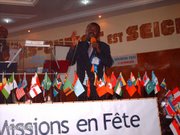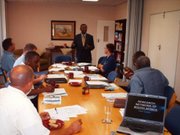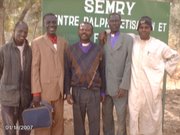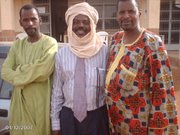Introduction
/ History
 |
| Sunday Musa, Pioneer Missionary |
The Dukawa of Nigeria are scattered across Kebbi,
Niger, Sokoto and Zamfara State. They are closely related to the Kamberri,
speaking a similar language, and are sometimes grouped under the large Hausa-Fulani
cluster of people. The Dukawa language is part of the Benue-Congo branch of the
Niger-Congo language family.
The Dukawa of Nigeria have a population of 154,000. They are part of the Benue people cluster. This people group are found only in Nigeria. Their primary language is Hun-Saare. The men average just under six feet in height and the women have strong healthy physiques from carrying heavy loads on their shoulders. They are intelligent people with a good knowledge of medicine. In 1968, many Dukawa around New Bussa, Niger State were forced off their homeland and resettled in villages around Borgu Local Government area due to the completion of the Kainji Dam Project. It is one of these by nme Tugan-Ali that Grace Foundation Missionaries labouring among the Kamberis took the gospel to and eventually planted a church among the people
The Dukawa of Nigeria have a population of 154,000. They are part of the Benue people cluster. This people group are found only in Nigeria. Their primary language is Hun-Saare. The men average just under six feet in height and the women have strong healthy physiques from carrying heavy loads on their shoulders. They are intelligent people with a good knowledge of medicine. In 1968, many Dukawa around New Bussa, Niger State were forced off their homeland and resettled in villages around Borgu Local Government area due to the completion of the Kainji Dam Project. It is one of these by nme Tugan-Ali that Grace Foundation Missionaries labouring among the Kamberis took the gospel to and eventually planted a church among the people
What
are Their Lives Like?
 |
| Nuhu & Sabatu Karanbana, Immediate past missionaries |
Dukawa homeland is hilly, rocky country where
rivers provide much fish and islands serve as fertile land for their crops.
They make their living as fishermen and farmers, mainly raising millet and
guinea corn in the highlands and onions along the rivers. Other crops include
maize, peanuts, sweet potatoes, and beans. The Dukawa grow their own tobacco,
and many of them enjoy smoking. Town dwellers also have large farms in the bush
where they live for part of the year.
Many defensive towns still remain in the Dukawa region; surrounded by strong, high walls with holes in them for guns and arrows. Deep moats surround the walls, outside which is another trench with low walls and prickly thorns. Some Dukawa live in small rural villages outside these towns. Their homes are small huts with walls only four feet high and containing mud beds, beneath which a fire burns. The Dukawa have a history of being great fighters; bows and poisoned arrows were their principal weapons. Successful hunters and warriors wore black shirts and bracelets made of the skins their victims. Hunting continues to be an important cultural aspect of Dukawa life. Arrows are sometimes fired out of guns, especially when hunting elephants.
The traditional dress for women was bundles of leaves tied around their waists. Brass rings are still worn in most women's lips, and ear ornaments are made of red stone or red silk. At Tugan-Ali, the Dukawas have drastically change as they now wear clothes. Circumcision is not a common practice among Dukawa. Instead, a boy's journey into manhood begins when he is able to wrestle. At that time, his father will give him a cloth and some land to farm for the next seven years, until he is ready to marry. Girls and boys have an opportunity to meet at the wrestling matches, and a girl is given flour to sprinkle over the head of the boy she chooses.
Many defensive towns still remain in the Dukawa region; surrounded by strong, high walls with holes in them for guns and arrows. Deep moats surround the walls, outside which is another trench with low walls and prickly thorns. Some Dukawa live in small rural villages outside these towns. Their homes are small huts with walls only four feet high and containing mud beds, beneath which a fire burns. The Dukawa have a history of being great fighters; bows and poisoned arrows were their principal weapons. Successful hunters and warriors wore black shirts and bracelets made of the skins their victims. Hunting continues to be an important cultural aspect of Dukawa life. Arrows are sometimes fired out of guns, especially when hunting elephants.
The traditional dress for women was bundles of leaves tied around their waists. Brass rings are still worn in most women's lips, and ear ornaments are made of red stone or red silk. At Tugan-Ali, the Dukawas have drastically change as they now wear clothes. Circumcision is not a common practice among Dukawa. Instead, a boy's journey into manhood begins when he is able to wrestle. At that time, his father will give him a cloth and some land to farm for the next seven years, until he is ready to marry. Girls and boys have an opportunity to meet at the wrestling matches, and a girl is given flour to sprinkle over the head of the boy she chooses.
 |
| Simon Peter, Currently serving |
What
are Their Beliefs?
Due to contact with Muslim traders, a number of
the Dukawa are Muslim. However, the majority of the Dukawa are idol worshippers.. They believe that at
death they will join their dead ancestors. They believe in-and claim to often
see-ghosts walking about at night. The ghosts are said to have fire coming
forth from their armpits and are known to beat people to death. Most
Dukawa believe in witchcraft and many gods. They are 6.5%
Christian but less than 0.5% evangelical.
The Dukawa are referred to as a
fine race.
Present
Status of Grace Foundation Labour Among the Dukawas
 |
| Joshua Adamu, Currently serving |
Sunday Musa, a graduate of Agriculture Extension
and Management pioneered the work. He
still oversee the work from his base at Samunaka but at the Tugan-Ali village where the work is located, Nuhu & Sabatu Karanbana have served as footsoldiers for many years and have grown the church planted there until recently when they were moved to Benin Republic to pioneer a new work. In their place, Simon Peter and Joshua Adamu were posted there. Simon is not yet married but Joshua is married with kids.
Facilities
on Ground
Through the help and partnership of the Missions
Supporters League, Kaduna Chapter headed by Mrs. Grace Makeri, we were able to
build a church. Sadly, the crack on the building was growing by the day and the
risk of the building collapsing on them were very obvious. The youths came
together, moulded mud blocks and with little help, they raised another
building. We also have a mission house which is already wearing out and
inadequate for the two missionaries
Immediate
Need
The need on the ground is prayer that God will
cause the people to respond to the gospel especially the adult. Most of the
converts currently are youths.
Secondly, the recent transfer of the missionary
couple on the field shook the field. They were very charismatic and loved by
the people. Pray that they will receive the new missionaries and respond to
their teachings.
The upkeep/welfare of the missionaries have been
major challenges. We are looking at the possibility of getting a grinding
machine for them to help augment the little support we send which is not very
regular.












No comments:
Post a Comment